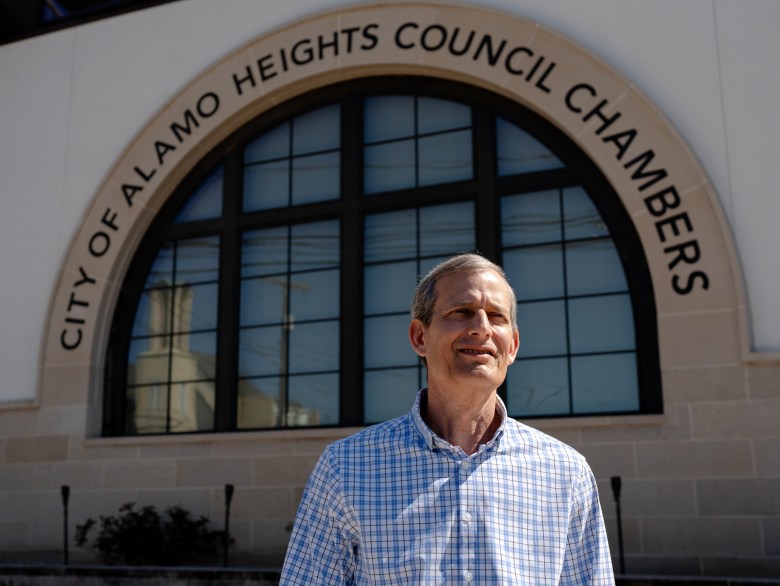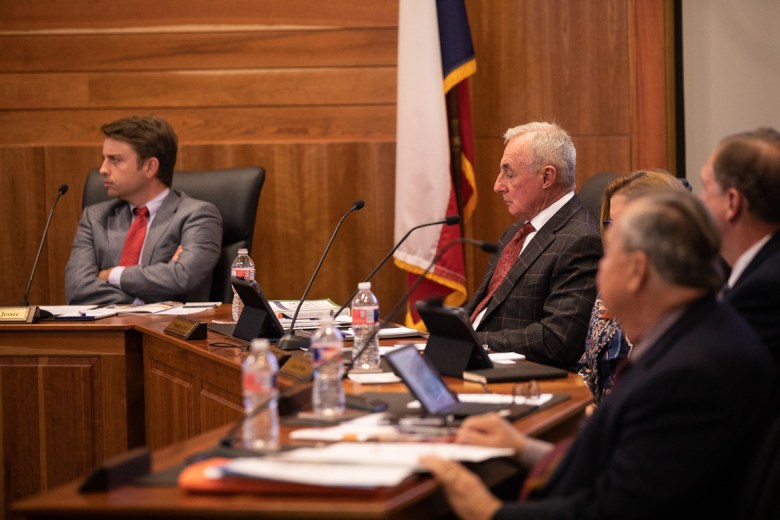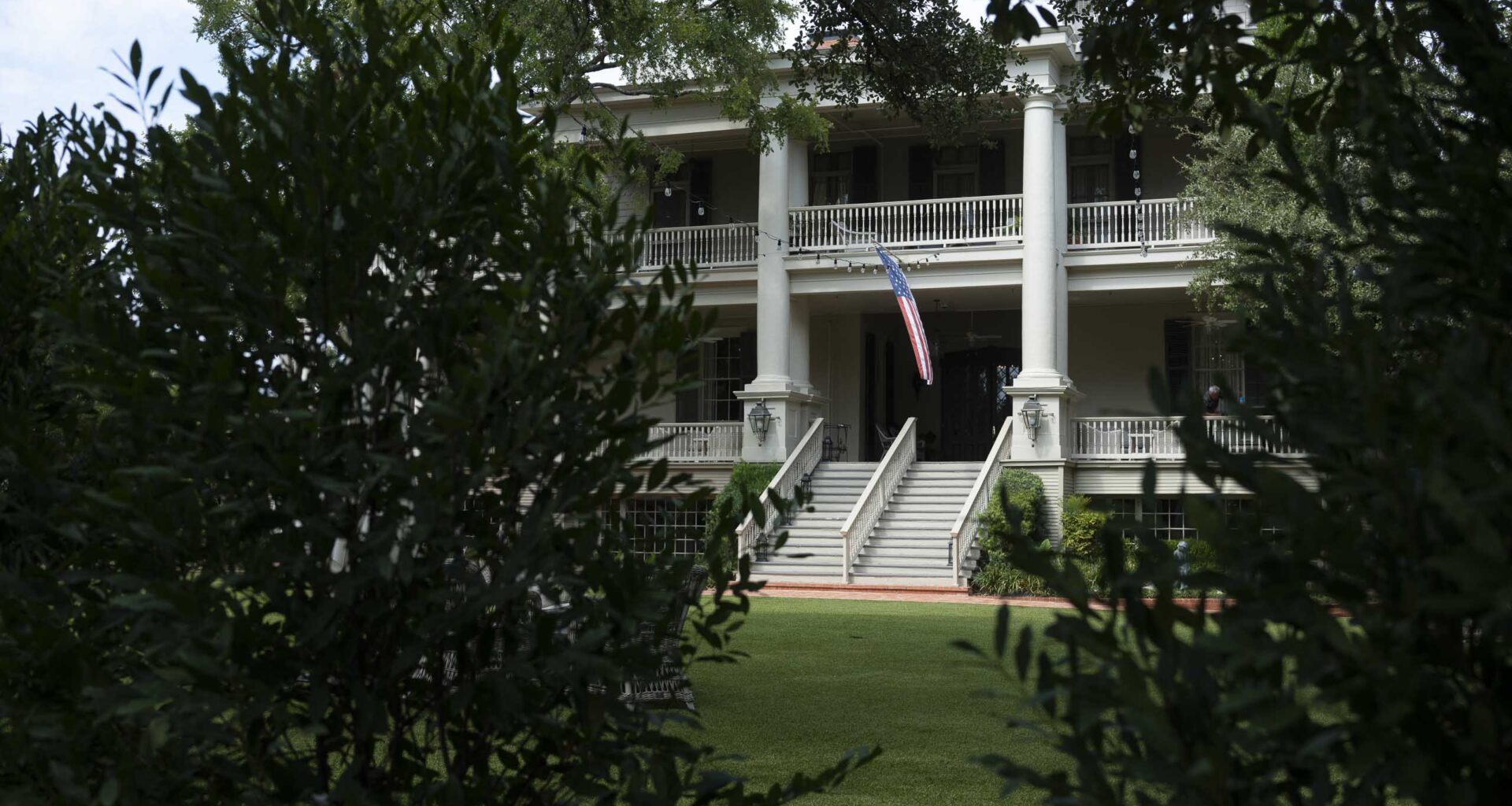Admitting that it is far from ideal, a majority of Alamo Heights City Council members voted on Monday to approve a controversial ordinance that green-lights a major expansion of The Argyle, a renowned private dining club.
The 4-1 council vote came after more than 30 people addressed the council, speaking for or against the merits of a special use permit, which will let the club’s owners proceed with plans to build a 10,000-square-foot extension onto its existing structure at 934 Patterson Ave, located in a neighborhood zoned for single-family homes.
Karl Baker was the lone council member to vote “no” on the special use permit.
The idea behind the expansion, The Argyle’s representatives have said, will grow the club’s ability to fit up to 1,200 people for events that are partially hosted in an outdoor area, among other accommodations.
Opponents, including the Neighborhood Preservation League of Alamo Heights, a nonprofit grassroots group, argued expanding The Argyle would compound the noise and traffic concerns that some neighbors experience during large club events.
The group’s leaders recently filed a temporary restraining order in hopes of having three Argyle members and elected leaders — Mayor Al Honigblum and Council members Blake Bonner and Lynda Billa Burke — recuse themselves from deliberating on the special use permit. League representatives claimed, those club members risked showing a conflict of interest.
But Honigblum told the crowd on Monday that a judge on Sunday rejected the TRO petition, and the entire council was able to cast their votes. Honigblum also noted that the City Attorney Frank Garza found no conflict of interest on the part of the mayor, Burke or Bonner.
 Al Honigblum, a real estate developer who served on the city’s Planning and Zoning Commission, was the only candidate running for mayor of Alamo Heights. He was elected in May. Credit: Brenda Bazán / San Antonio Report
Al Honigblum, a real estate developer who served on the city’s Planning and Zoning Commission, was the only candidate running for mayor of Alamo Heights. He was elected in May. Credit: Brenda Bazán / San Antonio Report
“Furthermore, I want to be transparent and let everyone know that I personally attempted to meet with every property owner within 200 feet of The Argyle, and an additional 12 property owners just beyond the 200 feet,” Honigblum said. “Additionally, Councilman (Lawson) Jessee and Councilman (Trey) Jacobson did the same. Our purpose was to get (neighbors’) thoughts and educate them and not persuade them.”
Jacobson was part of a council subcommittee that recommended permit revisions to alleviate critics’ concerns, and address the longterm issues presented by The Argyle, whose members help to raise funds for the Texas Biomedical Research Institute.
Jacobson said the revisions they recommended would let The Argyle enhance its event-hosting capabilities, and strengthen the city’s ability to enforce regulations pertaining to permanent and temporary structures, noise, parking and traffic around the club property.
One modification to the permit prohibits valets, buses, delivery vehicles and event employees from parking on surrounding residential streets.
Another revision calls for limiting the yearly number of overlapping small events involving 250 or fewer guests. The special use permit previously had no limit on smaller functions.
Jacobson said the city could act against The Argyle if there are multiple violations of these or other conditions in the special use permit, and if new construction or land use differs from what are allowed in the permit. He also said the city can convene a public meeting each year to see how well The Argyle is complying with conditions outlined in the special use permit.
Jacobson said subcommittee members, other residents and club representatives spent a lot of time trying to come up with a reasonable version of the special use permit.
“They can tell you there’s been long days, weekends, late nights, long calls and long meetings working through all this,” he said.
Still, many detractors remained opposed to the club’s plans, citing continuing worries about how expansion and hosting large events could impact traffic, parking and noise in the surrounding neighborhood.
“Having more traffic, especially in the evenings, does present a safety concern,” resident Claire Alexander said.
NPLAH President Ann McGlone said that, in addition to public safety and noise concerns, allowing the club to expand could disrupt the atmosphere of the community.
“This SUP just isn’t good for the neighborhood,” she added.
Resident Walter Brown, said management for The Argyle has always sought to address people’s concerns, and that allowing expansion of the club will help the institution’s fundraising capabilities and benefit the community as a whole.
Calling The Argyle “a jewel” in Alamo Heights, resident Ken Guglielmo said critics of the special use permit do not fully appreciate what the club offers to the community.
“This jewel that exists in the middle of this neighborhood contributes not only tens of millions, but hundreds of millions of dollars on the coattails to philanthropy, and it provides a venue for weddings, birthdays, celebrations of life and all kinds of memories,” he added.
 Alamo Heights City Council discusses and approves the Argyle Club parking lot on Nov. 13, 2018. Credit: Bonnie Arbittier / San Antonio Report
Alamo Heights City Council discusses and approves the Argyle Club parking lot on Nov. 13, 2018. Credit: Bonnie Arbittier / San Antonio Report
Baker said he voted against the special use permit because it marks a deviation from what he called clear, consistent policy that serves to preserve the characteristics of a residential neighborhood.
“What would be the justification for a singular and significant departure from our long-standing policies?” Baker asked.
But fellow councilors said, while the revised special use permit is imperfect, it is a compromise that offers mechanisms for enforcement of permit conditions, gives The Argyle what it wants, and strives to protect neighbors.
“We do have tools now that we didn’t have before that are objective and that can start
eliminating events immediately if things get out of control,” Jessee said. “I think it’s a win-win-win. I don’t think this deal is perfect, but I think at the end of the day, the pros outweigh the cons.”
Afterward, McGlone said she is disappointed in the decision.
The council also voted 4-1 — with Baker in opposition — to approve the final designs for the club’s planned expansion and renovations.
